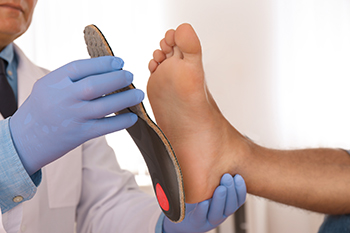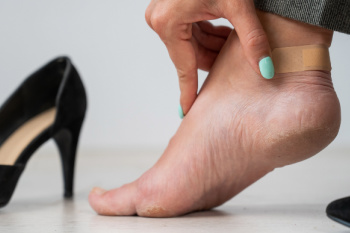Bremerton | Port Orchard (360) 377-2233

Plantar fasciitis is a common condition that causes heel pain and results from inflammation of the plantar fascia, a thick band of tissue connecting the heel to the toes. Heel pain often develops from repetitive stress or overuse, particularly in people who spend long hours on their feet, such as healthcare workers, teachers, or retail employees. Poor footwear, tight calf muscles, or high-impact activities like running can worsen the problem. The pain can be sharp, especially with the first steps in the morning or after prolonged sitting. Addressing plantar fasciitis early is key to preventing it from becoming chronic. Rest your feet, stretch regularly, and wear supportive footwear. A podiatrist can assess your condition and recommend treatments like custom orthotics, targeted stretching, or night splints. For severe cases, treatments may include advanced therapies like corticosteroid injections, extracorporeal shockwave therapy, or surgery. If you have pain from plantar fasciitis, it is suggested that you schedule an appointment with a podiatrist for care.
Plantar fasciitis can be very painful and inconvenient. If you are experiencing heel pain or symptoms of plantar fasciitis, contact one of our doctors from Kitsap Foot & Ankle Clinic. Our doctors can provide the care you need to keep you pain-free and on your feet.
What Is Plantar Fasciitis?
Plantar fasciitis is the inflammation of the thick band of tissue that runs along the bottom of your foot, known as the plantar fascia, and causes mild to severe heel pain.
What Causes Plantar Fasciitis?
How Can It Be Treated?
While very treatable, plantar fasciitis is definitely not something that should be ignored. Especially in severe cases, speaking to your doctor right away is highly recommended to avoid complications and severe heel pain. Your podiatrist can work with you to provide the appropriate treatment options tailored to your condition.
If you have any questions please feel free to contact one of our offices located in Bremerton and Port Orchard, WA . We offer the newest diagnostic and treatment technologies for all your foot and ankle needs.

A plantar ulcer is an open sore that develops on the bottom of the foot, often due to high pressure or poor circulation. For people with diabetes and peripheral neuropathy, these ulcers can become a recurring issue, especially if they have had them before. Custom shoe orthotics can help reduce pressure on the feet, lowering the risk of these ulcers returning. Research shows that orthotics shaped to fit the foot and designed based on pressure points are more effective in preventing ulcer recurrence than standard orthotics. However, while these specialized orthotics can reduce ulcers, they do not necessarily prevent other types of foot lesions. If you have diabetes, it is strongly suggested that you visit a podiatrist for a personalized foot evaluation and directed treatment for you, which may include orthotics.
If you are having discomfort in your feet and would like to try orthotics, contact one of our doctors from Kitsap Foot & Ankle Clinic. Our doctors can provide the care you need to keep you pain-free and on your feet.
What Are Orthotics?
Orthotics are inserts you can place into your shoes to help with a variety of foot problems such as flat feet or foot pain. Orthotics provide relief and comfort for minor foot and heel pain but can’t correct serious biomechanical problems in your feet.
Over-the-Counter Inserts
Orthotics come in a wide variety of over-the-counter inserts that are used to treat foot pain, heel pain, and minor problems. For example, arch supports can be inserted into your shoes to help correct overarched or flat feet, while gel insoles are often used because they provide comfort and relief from foot and heel pain by alleviating pressure.
Prescription Orthotics
If over-the-counter inserts don’t work for you or if you have a more severe foot concern, it is possible to have your podiatrist prescribe custom orthotics. These high-quality inserts are designed to treat problems such as abnormal motion, plantar fasciitis, and severe forms of heel pain. They can even be used to help patients suffering from diabetes by treating foot ulcers and painful calluses and are usually molded to your feet individually, which allows them to provide full support and comfort.
If you are experiencing minor to severe foot or heel pain, it’s recommended to speak with your podiatrist about the possibilities of using orthotics. A podiatrist can determine which type of orthotic is right for you and allow you to take the first steps towards being pain-free.
If you have any questions please contact one of our offices located in Bremerton and Port Orchard, WA . We offer the newest diagnostic and treatment technologies for all your foot and ankle needs.

Wearing high heels can lead to significant heel and ankle pain due to the unnatural positioning of the foot. High heels shift your body weight forward, putting extra pressure on the toes, ball of the foot, and heel. Over time, this can lead to conditions like plantar fasciitis, Achilles tendonitis, or ankle sprains. The prolonged stress on the foot's arch and the ankle can also cause discomfort and swelling. The causes of heel and ankle pain from high heels include improper alignment, muscle strain, and pressure on the sensitive structures of the foot. Wearing heels that are too high, too tight, or lack proper cushioning can worsen these issues. Treatment often includes rest, stretching, and wearing supportive shoes. A podiatrist can provide tailored recommendations, such as custom orthotics, targeted exercises, or advice on choosing shoes that protect your feet. If you are experiencing heel or ankle pain from high heels, it is suggested that you schedule an appointment with a podiatrist.
High heels have a history of causing foot and ankle problems. If you have any concerns about your feet or ankles, contact one of our doctors from Kitsap Foot & Ankle Clinic. Our doctors can provide the care you need to keep you pain-free and on your feet.
Effects of High Heels on the Feet
High heels are popular shoes among women because of their many styles and societal appeal. Despite this, high heels can still cause many health problems if worn too frequently.
Which Parts of My Body Will Be Affected by High Heels?
What Kinds of Foot Problems Can Develop from Wearing High Heels?
How Can I Still Wear High Heels and Maintain Foot Health?
If you want to wear high heeled shoes, make sure that you are not wearing them every day, as this will help prevent long term physical problems. Try wearing thicker heels as opposed to stilettos to distribute weight more evenly across the feet. Always make sure you are wearing the proper shoes for the right occasion, such as sneakers for exercising. If you walk to work, try carrying your heels with you and changing into them once you arrive at work. Adding inserts to your heels can help cushion your feet and absorb shock. Full foot inserts or metatarsal pads are available.
If you have any questions please feel free to contact one of our offices located in Bremerton and Port Orchard, WA . We offer the newest diagnostic and treatment technologies for all your foot and ankle needs.